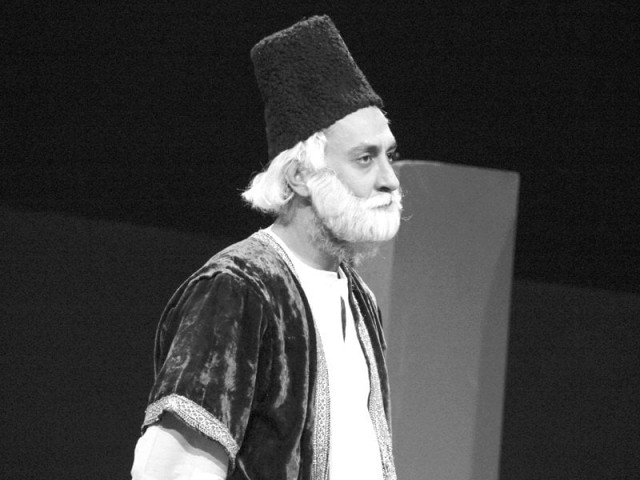NAPA shows Ghalib and Manto in conversation
It is a gap of less than 50 years between the two that makes this performance interesting.

The live music complements the performance perfectly. PHOTO: PUBLICITY
Ghalib aur Manto: Ek Guftugoo is Napa’s (National Academy of Performing Arts) rendition of a possible interaction between Manto and Ghalib.
It is not difficult to find similarities between two maestros of not so different eras; where the well-known Urdu poet Mirza Asadullah Khan Ghalib lived from 1797-1869, Manto the short story writer lived from 1912-1955, and it is a gap of less than 50 years between the two that makes this performance interesting.
In this conversation, the focus on the similarity between the two literary personalities’ socio-political and personal circumstances is the most interesting. Manto’s personal experiences were not as distressing as Ghalib’s, however, their works had a dark undertone which was reflected throughout their lives.

Legal action was taken against a number of Manto’s writings, as they were considered, socially unacceptable whereas Ghalib’s name was counted amongst reputable poets of the Darbaar (court) much later in his life; initially, he was ridiculed, labeled as leading an ‘unacceptable’ social life full of gambling and drinking. However, the most important occurrences in both of their lifetimes were political upheavals; Ghalib saw Delhi losing its soul during and after the War of Independence in 1857 and Manto’s seminal stories revolved around partition in 1947 and the post-partition chaos.

In this preview performance on Friday — which is scheduled to open at a literary festival in Calcutta later in January — Adnan Jaffar (as Mirza Ghalib) and Nazarul Hasan (as Manto) made their way to the stage. They drew listeners into the characters of these masters, showing Manto being exposed from Ghalib’s perspective as they indulge in a conversation about life. The word play and dialogue delivery make the melancholy surrounding their circumstances apparent in a vivid manner. Sunil Shankar (director of the performance) enters the stage to read an essay by Manto titled Mae Afsanay Kyun Likhta Hoon. Shankar comes on stage at several intervals to read different essays from Manto, a letter and a poem by Ghalib as well, but on the preview night he failed to deliver and his performance lacked finesse.
“I need to rehearse a lot more and I know that very well,” Shankar told The Express Tribune after the performance. “I was concentrating more on directing than my own performance but I guess we were short on time and we will have to work harder before we hit Calcutta.”
With time, the performance becomes more engaging, as it slowly travels through a dramatic crescendo of both of their lives, starting from lighter themes to eventually the darkest corner of their lives. The live music complements the performance perfectly.
The music is led by Ahsan Iqbal Bari who has composed most of the ghazals in the performance, with a few exceptions by Arshad Mehmood. Sara Haider soothes the audience with her soulful voice accompanied by Bari, whereas Zeeshan Pervaiz, a Napa graduate, finds the limelight with his bass guitar.

If there is anything noticeable about the performance it’s the concept of Ghalib and Manto’s fictional interaction, or a contemporary musical take on Ghalib’s poetry. The poems that are performed are not popular amongst musicians who have previously composed Ghalib, and that is why it is refreshing to listen to poems like Jor Sae Baaz Aaye, Dard Minnat Kashe Dawa and Baazechaye Itfaal Hai. There is no needless demonstration of vocal talent; the band on its own is good enough to tell a new listener that the performance has been intentionally kept minimalistic, despite the band’s potential of putting up an extraordinary show.
Artistic director of Napa Zain Ahmed was not satisfied with the performance and felt that some major elements were missing.
“I wanted the theme of exile to be prominent,” said Ahmed, critical of the actor’s performance. “I believe Manto’s exile in Pakistan and his everlasting love for his real home which was Bombay was not prominent enough. Ghalib’s concern about the War of Independence and what it had done to Delhi were more important than anything else.”
Ahmed’s concerns are appropriate; Manto and Ghalib’s existentialist dilemmas and rejection from the society are not unknown to people, so delivering a convincing performance will need work. “We have 36 hours to work on it,” Shankar laughs. “I am sure the real tweaking will begin once we sit in the train and head out to Calcutta from Amritsar.”
Published in The Express Tribune, January 6th, 2013.
Like Life & Style on Facebook for the latest in fashion, gossip and entertainment.



















COMMENTS
Comments are moderated and generally will be posted if they are on-topic and not abusive.
For more information, please see our Comments FAQ